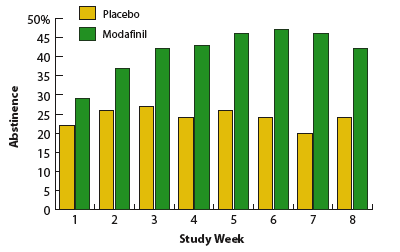Modafinil to treat Addiction
Studies have shown that Modafinil (Provigil) can help people beat cocaine addition. It's not a magic pill by any means, and in trials it was effective for some patients in conjunction with behavioral therapy.
Why does Modafinil help? Among other functions, it enhances brain levels of the neurotransmitter glutamate. Repeated cocaine use has been shown to deplete glutamate levels. By increasing the levels, modafinil may work at the core of the craving for the drug.

(graphic from the National Institute on Drug Abuse website)
What if you need to treat cocaine addiction? It is estimated a million Americans have concaine use disorder in any year. Modafinil is not a standard therapy. Treatment experts may not be used to it and may prefer other methods. However, any doctor can prescribe Modafinil for any reason he or she deems legitimate.
Modafinil blocks the euphoric effects of cocaine. The National Institute on Drug Abuse announced results of an investigation into whether mofafinil could help cocaine-dependent patients abstain. While it did not turn out to be a wonder drug, modafinil did turn out to be useful, with behavioral therapy, for helping people stay off cocaine.
A recent study at UCLA showed that some medications, including modafinil, could be useful in methamphetamine treatment. A small trial of Provifil on methamphetamine addicts in Australia found "promise" and recommended a larger trial. The US National Institute on Drug Abuse published a study in 2012 on modafinil for methamphetamine addiction, but the results were disappointing.
A laboratory study of the interaction of modafinil with brain receptors found that modafinil acted like agonists under investigation for treating cocaine dependence. This study, funded by the U.S. National Institute on Drug Abuse, found modafinil might influence the brain's nondopaminergic mechanisms and the authors suggested the drug should be investigated for methamphetamine addiction. A study published in 2009 found that cocaine addicts given modafinil along with behavioral therapy wew able to stay off cocaine better than those who didn't take modafinil. This was for people who didn't have an alcohol problem.
Sleep disorders frequently plague both cocaine addicts and people trying to quit cocaine. The quality of sleep (the architecture of the cycles) declines when the user first quits. A study published in the American Journal of Psychiatry found that Provigil (modafinil) was useful in normalizing the sleep pattern. Compared to those on placebos, people taking modafinil had longer sleeping time during the third week of withdrawal, and more deep sleep.
What about smoking? Unfortunately, a recent attempt to use modafinil to help with nicotine withdrawal was unsuccessful. They tried just Provigil and Provigil in combination with a nictoine lozenge, but it did not ease the symptoms of withdrawal. A second study comparing Provigil to a placebo suggested that the Provigil actually made the patient smoke more.
Modafinil potentiates cocaine self-administration but not the effects on DA levels in rodents.
Modafinil potentiates cocaine self-administration by a dopamine-independent mechanism
Different Kind of Stimulant
